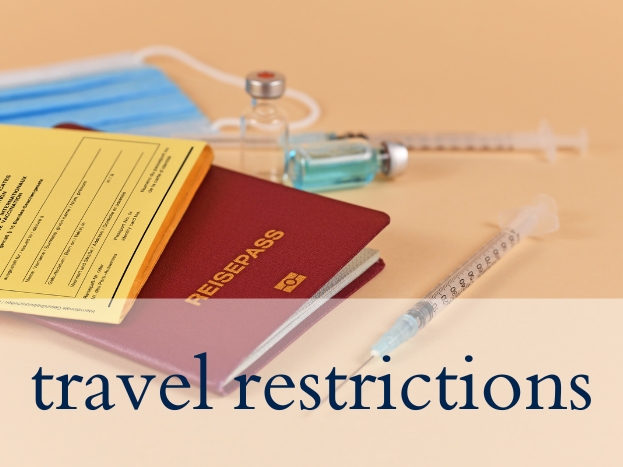In an increasingly interconnected world, travel restrictions and bans have become more common due to various reasons such as health crises, political tensions, or security concerns. These measures can significantly impact your travel plans, and it’s essential to understand the legal implications involved. This article explores what travel restrictions and bans mean for travelers and how to navigate these challenges legally. Learning more with visa.javanet247
1. What Are Travel Restrictions and Bans?
Travel restrictions and bans are legal measures imposed by governments to control or limit the movement of people across borders. These can take various forms, including:
- Entry Bans: Prohibition of entry for citizens from certain countries.
- Quarantine Requirements: Mandatory isolation for travelers coming from specific regions.
- Visa Suspensions: Temporary halt in the issuance of visas for certain countries.
- Flight Suspensions: Cancellation of flights to and from specific destinations.
These measures are often implemented to protect public health, national security, or respond to international disputes.
2. Legal Grounds for Imposing Travel Restrictions and Bans
Governments have the authority to impose travel restrictions and bans based on several legal grounds:
- Public Health: During health emergencies, such as pandemics, countries may restrict travel to prevent the spread of disease. This is often supported by international health regulations, such as those set by the World Health Organization (WHO).
- National Security: Travel bans may be imposed to protect national security interests, especially in times of conflict or political instability.
- Immigration Control: Countries may implement travel restrictions to manage immigration and control the flow of people across their borders.
- Diplomatic Relations: Travel bans can also be a tool in international diplomacy, used as a response to diplomatic disputes or sanctions.
3. Impact on Travelers
Travel restrictions and bans can have significant consequences for travelers, including:
- Canceled Trips: If a travel ban is imposed on your destination, your trip may be canceled, potentially leading to financial losses.
- Visa Issues: Visa applications may be denied or revoked, leaving you unable to enter your planned destination.
- Quarantine Requirements: Travelers may be required to quarantine upon arrival, impacting the duration and cost of their trip.
- Legal Penalties: Attempting to bypass travel restrictions can result in fines, detention, or deportation.
4. Understanding Your Legal Rights
As a traveler, it’s crucial to understand your legal rights when facing travel restrictions or bans:
- Right to Refund or Compensation: Depending on the circumstances and local laws, you may be entitled to a refund or compensation if your trip is canceled due to travel restrictions.
- Right to Information: Airlines and travel agencies are required to inform you about any travel restrictions that may affect your journey.
- Right to Appeal: In some cases, you may have the right to appeal a visa denial or entry ban, though this process can be complex and time-consuming.
- Right to Legal Assistance: If you find yourself stranded or in legal trouble due to travel restrictions, you have the right to seek assistance from your country’s embassy or consulate.
5. Navigating Travel Restrictions Legally
To navigate travel restrictions and bans legally, consider the following steps:
- Stay Informed: Regularly check travel advisories from official government sources for the latest updates on restrictions and bans.
- Review Travel Insurance Policies: Ensure your travel insurance covers cancellations due to travel bans or restrictions. Some policies may include coverage for pandemics or other emergencies.
- Consult with Legal Experts: If you face legal challenges related to travel restrictions, consulting with an immigration lawyer or legal expert can help you understand your options.
- Plan for Contingencies: Have backup plans in place, such as alternative destinations or flexible travel arrangements, in case your original plans are disrupted.
6. Recent Examples of Travel Restrictions
Understanding recent examples of travel restrictions can provide context for how these measures are applied:
- COVID-19 Pandemic: The global outbreak of COVID-19 led to widespread travel bans, quarantine requirements, and visa suspensions, significantly impacting international travel.
- Political Sanctions: Countries under international sanctions, such as North Korea and Iran, often face travel bans that restrict entry by foreign nationals.
- Terrorism Concerns: In response to terrorism threats, some countries have imposed travel bans on individuals from specific regions or those with ties to extremist groups.
7. Future Implications of Travel Restrictions
As global dynamics shift, travel restrictions and bans may continue to evolve:
- Increased Digital Surveillance: Post-pandemic, there may be an increase in digital tracking and health monitoring as a condition for travel.
- Greater Emphasis on Regional Travel: With the unpredictability of international travel, there may be a shift towards regional travel, where restrictions are easier to manage.
- Legal Challenges: There may be increased legal challenges to travel bans, particularly those perceived as discriminatory or unjustified.
Conclusion
Travel restrictions and bans are complex legal tools that can significantly impact your travel plans. Understanding the legal implications of these measures is essential for ensuring that you navigate them correctly and protect your rights as a traveler. Always stay informed, review your options, and seek legal advice if necessary to handle travel restrictions effectively.

